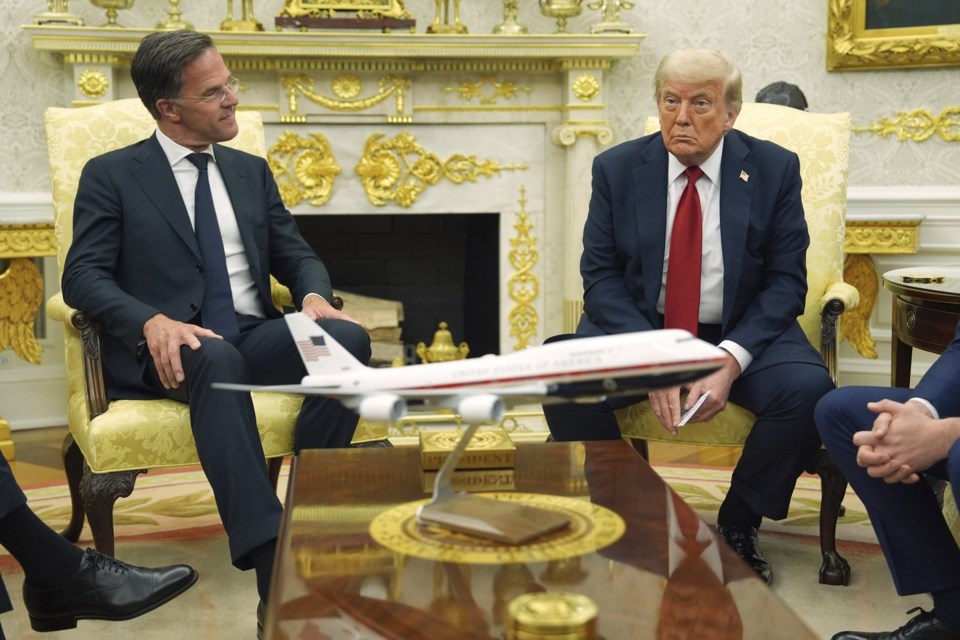U.S. President Donald Trump said on Monday that the letters he sent to Prime Minister Mark Carney and other leaders about new tariff rates are "the deals", as Carney prepares to meet with his cabinet on tariffs and the trade negotiations.
Trump appeared to be losing patience with his administration's efforts to make trade deals with nations around the world. The president has been sending letters to trading partners, including Canada, threatening to impose higher tariff rates on Aug. 1. The letter addressed to Carney last week said Canada would be hit with 35 per cent tariffs but the White House later said it would not include goods compliant with the Canada-U.S.-Mexico Agreement on trade.
"I watched a show this morning and they were talking about, 'Well when's he going to make the deal?' The deals are already made. The letters are the deals. The deals are made. There are no deals to make," Trump said during an Oval Office meeting with NATO Secretary-General Mark Rutte.
"They would like to do a different kind of a deal and we are always open to talking."
Trump Saturday posted a letter to Mexican President Claudia Sheinbaum on social media which said Mexico would be hit with a 30 per cent rate.
A separate letter to European Commission President Ursula von der Leyen declared a 30 per cent rate for the European Union.
There is no clarity on why Canada is facing a higher tariff than either Mexico or the EU.
Christopher Sands, director of Johns Hopkins University’s Center for Canadian Studies, said Canada and Mexico are the top two U.S. trade partners, and Canada is a national security partner as well.
"Now, Canada is hit with a 35 (per cent) tariff while Mexico only gets a 30 (per cent) tariff," Sands said in a text message. "Carney went the extra mile for Trump until now but he may not have the public support in Canada to continue it for long."
In a recent Substack post, Sands noted Carney has been proactive on defence and border security spending. It would be hard for the U.S. to claim Canada was not bargaining in good faith, Sands wrote. While Canada was "nice" it got hit with a tariff nearly as high as the 50 per cent Brazil is facing, he wrote.
Carney and Trump have been negotiating what they have referred to as a new economic and security pact since they pair met at the White House in early May. At the G7 summit last month, Carney said they had set July 21 as a deadline for reaching that deal.
Trump moved that to Aug. 1 last week unilaterally.
Trump raised tariffs on steel and aluminum from 25 to 50 per cent in June and Carney has held off following suit that pending the possibility of a deal. Canada has made a few other moves to aid industry on this side of the border, including new limits on the amount of foreign steel that can come in before high tariffs are charged.
On Monday Canada implemented a new interim policy on reciprocal procurement to restrict the ability of companies to bid on government contracts if their home country limits Canadian access to their government contracts. Procurement Minister Joël Lightbound said the policy is meant to prioritize Canadian companies and those from "reliable trading partners."
Carney will meet with his cabinet on Tuesday for the first time since Trump's latest volley in the trade deal, and he is to meet with premiers next week.
Fen Hampson, an international affairs professor at Carleton University, said that Carney should keep his head down, not take the bait of responding directly in public to Trump's latest threat and get the best deal possible at the table with American officials.
"There is a fundamental asymmetry in the Canada-US trading relationship. We're largely in the business of exporting commodities and intermediate goods, and that gives Trump a certain amount of leverage," Hampson said.
"But it also exposes US industries, US manufacturers. We're already seeing evidence of that, you now, the 50 per cent tariff on aluminum."
Hampson said that if Trump is going to respond to anything, it is these domestic pressures of American consumers and manufacturers being charged more for goods and materials.
"He's beginning to get political blowback, and this comes back to Canada, we just have to be patient," Hampson said.
"That's very difficult when people are saying, 'you've got to stand up to this guy, you got a wield the big stick.' No, that's not how you win with Trump."
Trump's tariff letter once again targets the issue of fentanyl coming from Canada to the U.S., the original justification for tariffs on both Canada and Mexico along with illegal immigration and border security.
U.S. Customs and Border Protection data shows that about 26 kilograms have been seized at the Canadian border this fiscal year, while 3,700 kilograms of the drug have been seized at the Mexican border in the same time frame.
This report by The Canadian Press was first published July 14, 2025.
David Baxter and Kelly Malone, The Canadian Press



